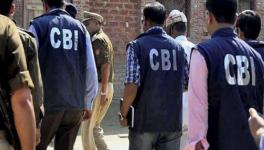Karnataka: Chronology of an Unusual Bribery Case
Former ADGP of ACB, Seemanth Kumar Singh and Former Bengaluru DC, J Manjunath (Left to Right)
Bengaluru: The corruption case against the former Bengaluru Urban Deputy Commissioner (DC) J Manjunath is a most unusual one. In July, he was arrested by the anti-corruption bureau (ACB) in a bribery case. However, he received default bail on September 3 as the investigating agency had not filed the charge sheet within 60 days of arrest.
In fact, there was one good reason why the agency could not file the charge sheet in time - somewhere between the arrest and bail of the DC, the ACB itself got disbanded by the Karnataka High Court. Here is the chronology of events in this extraordinary case.
The Chronology
May 18 - The complainant Azam Khan visits the DC office in Bengaluru and meets him and Deputy Tehsildar in anticipation of settling a property dispute. He is allegedly asked by the Deputy Tehsildar, PS Mahesh, to pay a bribe to receive a ruling in his favour.
May 20 - A furious Azam Khan approaches the ACB and files a complaint against the DC and the Deputy Tehsildar.
May 21 - A trap is set, and Azam Khan visits the DC office and hands over Rs 5 Lacs to an associate of PS Mahesh. The ACB swoops in and arrests both PS Mahesh and his associate. However, the DC is not detained or arrested.
June 29 - During the bail petition of PS Mahesh in the Karnataka High Court, Justice HP Sandesh demands to know why the FIR did not mention the name of the Deputy Commissioner despite him being named in Azam Khan’s complaint. He also passes strong remarks against the head of the ACB, i.e. ADGP Seemanth Kumar Singh (IPS), and comments that he is not working for the institution for which he has been appointed. The judge demands a copy of the service record of the ADGP and also directs the ACB to produce statistics regarding B-reports (closure reports) filed by it in cases of disproportionate assets as well as cases where the accused persons were trapped while taking a bribe.
July 1 - Justice Sandesh attends a dinner, where he is informally threatened with transfer by a fellow judge. The unnamed judge allegedly warned him about the ADGP being a powerful man and informed Justice Sandesh that ‘people in Delhi’ called to inquire about his political leanings. This is placed on record at a later date.
July 4 - Deputy Commissioner J Manjunath is finally arrested by the ACB in the same case.
July 7 - Justice HP Sandesh peruses the B-reports filed by the ACB and states in his order that the ACB had failed to uphold public interest, due to which the court will now have to monitor the investigation.
July 11 - Justice HP Sandesh peruses the service record of ADGP Seemanth Kumar Singh. Between 2008-2009, the ADGP was the SP at Bellary (a mining hub of Karnataka, especially for Iron Ore). In one instance, he was transferred out of Bellary but was then moved back within six days. The judge also notes a raid at his residence by the CBI in April 2013 in a case related to illegal mining in Bellary. Sandesh writes that the case was not taken to its logical conclusion. Sandesh directs the Chief Secretary and the DAPR to ensure that ‘tainted officers’ must not be posted to institutions established to prevent corruption. In his order, he places on record the allegation of the threat of transfer.
July 13 - ACB approaches Supreme Court seeking a stay order in the case.
July 18 - Supreme Court stays proceedings against the ACB and says that the observations of the Karnataka High Court bench against the agency were ‘irrelevant’ in the bail hearing of the accused. A notice was also sent to the High Court Registrar regarding the omission of statements made by Justice Sandesh in his previous order.
July 21 - Deputy Tahsildar PS Mahesh receives default bail because the ACB failed to file a charge sheet within 60 days of arrest.
August 3 - A fresh bail plea of J Manjunath is heard at the Karnataka High Court. At the bail hearing, the Special Public Prosecutor, on behalf of the ACB, objects to Manjunath’s bail petition. Justice K Natarajan rejects his bail. The judge remarks that corruption had become rampant in the revenue department from the top rank to the lower level and that no file moves without a bribe. He also observes in his order that Manjunath’s name is not mentioned in the FIR registered by the ACB, even though the complainant mentions his name in the First Information statement.
It is contended that, in the case of Azam Khan, the final order in the property case was to be pronounced on March 30, 2022, but the order was kept pending until the bribe was paid. The ACB also seized a copy of the draft order which only required the signature of the DC. The ACB alleged that this was the modus operandi of the Revenue Department. A draft of the order was allegedly prepared and shown to the respective person in order to tempt him to pay a bribe and end his ordeal.
August 11 - ACB is disbanded by the Karnataka High Court in an unrelated case. A batch of 15 writ petitions was filed in the HC challenging the creation of the Karnataka ACB in 2016. A two-judge bench of the HC agrees with the petitioners and passes orders disbanding the ACB.
September 3 - J Manjunath receives default bail as the charge sheet was not filed within 60 days of arrest.
Shortly after the ACB raid, Manjunath was transferred out of the Revenue Department. At the time of his arrest, he was the Director of the Integrated Child Welfare Scheme. Following his arrest, he was suspended by the Karnataka government. The case will now be handled by the Karnataka Lokayukta.
Get the latest reports & analysis with people's perspective on Protests, movements & deep analytical videos, discussions of the current affairs in your Telegram app. Subscribe to NewsClick's Telegram channel & get Real-Time updates on stories, as they get published on our website.
























